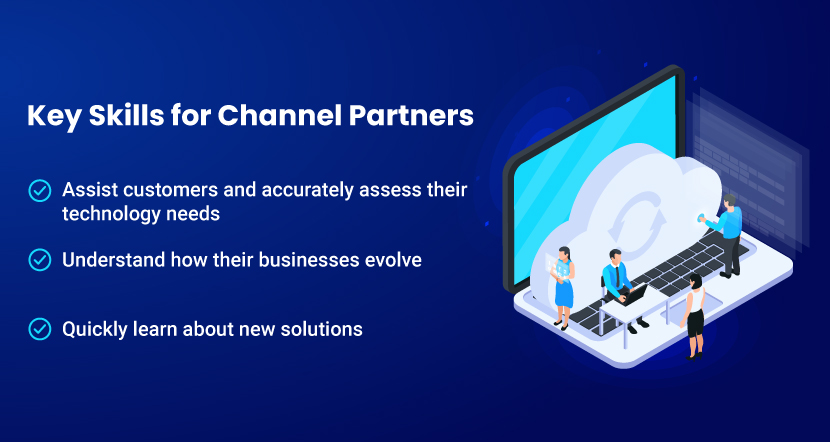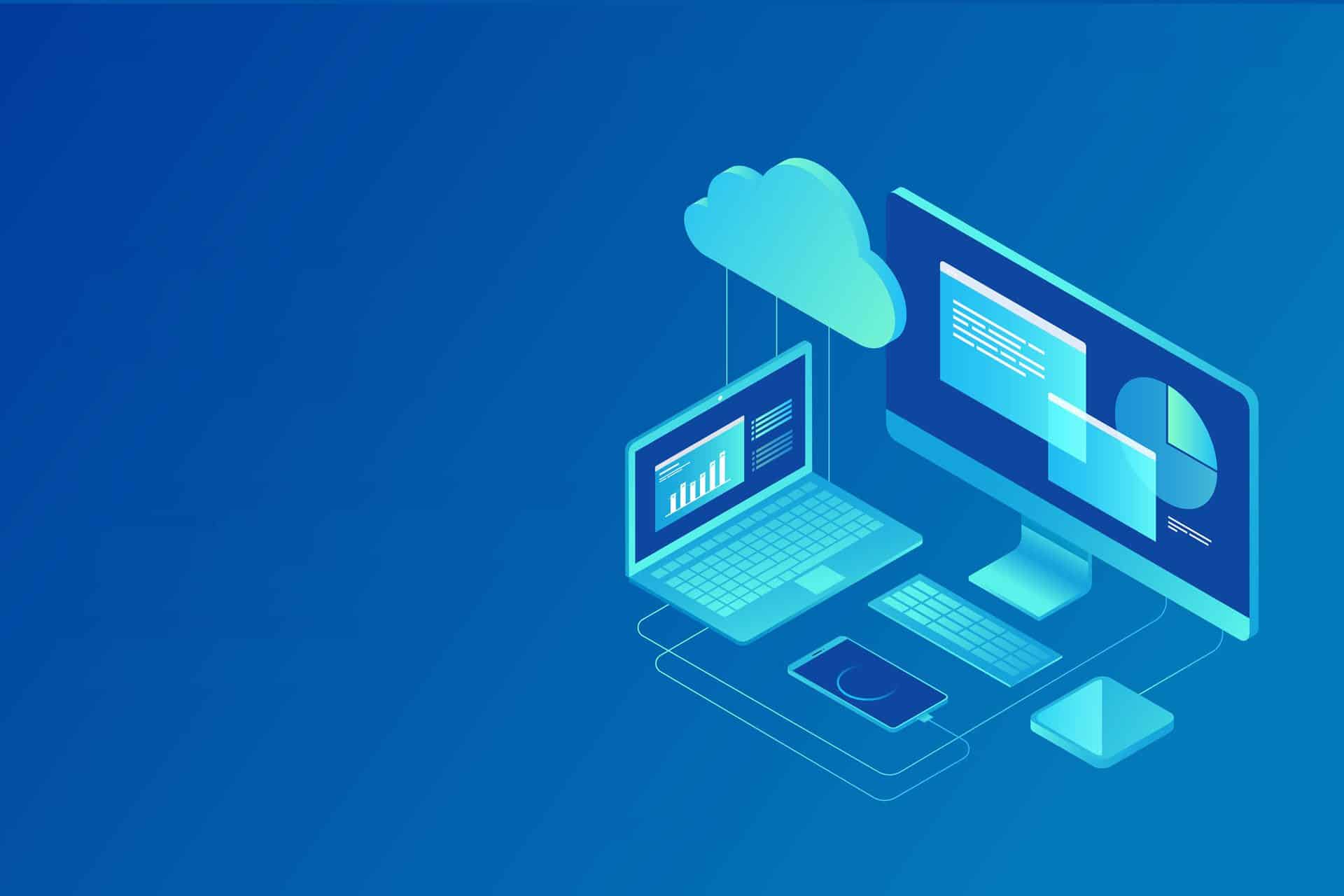Cloud computing technology has brought about radical changes to the way modern technology is developed, sold, distributed, and employed. Modern organizations increasingly choose as-a-service solutions and complementary cloud services in a rush to digitally transform their businesses. The accelerated adoption of cloud services and solutions has turned selling these into a potentially lucrative business.
Though the cloud offers incredible opportunities for channel partners, success in this increasingly competitive market doesn’t come easy. Resellers and MSPs looking to jump on the bandwagon of selling cloud services must adapt to the ever-changing markets and customers’ needs.
Additionally, they must be extremely cautious and avoid common pitfalls that could negatively impact their cloud selling journey (diminishing margins, decreased efficiency, etc.)
This article will provide best practices for channel partners to successfully sell cloud services.

Why You Should Offer Cloud Computing Services?
We witnessed exceptional growth in adopting cloud services and solutions during the last two years. The demand for infrastructure services in 2022 is reaching a new all-time high.
According to Gartner, the Worldwide IaaS Public Cloud Services Market Grew 40.7% in 2020, reaching $64.3 billion, up from $45.7 billion in 2019. Technology consumption from any dimension, cloud, data center, application, cybersecurity, or end-user viewpoint has grown exponentially.
Furthermore, in its recent Forecast Analysis: Cloud Managed Services, Worldwide, Gartner gives the following estimates by 2026:
- 94% of large organizations are expected to use external service providers for cloud management and support to a certain extent (up from 80% in 2020).
- 26% of large organizations in mature economies will work with MSPs on their cloud-based digital transformation initiatives (up from 14% in 2020).
- MSPs will be engaged for cloud-native architecture and operations by 45% large organizations in mature economies.
The cloud landscape has evolved to the point where multi-cloud becomes the new normal. Despite tremendous opportunities for cloud resellers, the new reality brings new sets of challenges they will have to overcome in the future.
How to Sell and Promote Cloud Computing Services?
Channel is abruptly becoming the most dominant method of distributing cloud services. Though its enormous potential for distributing digital products was recognized long ago, it seems that its role has never been more important. Modern VARs and MSPs have an irreplaceable role in delivering advanced technology solutions to customers across industries.
The recent report from Ingram Micro Cloud, State of Cloud, supports this claim. The report states that currently, 20-30% of cloud products are being resold, and in the coming decade, we can expect one-third of all cloud products to be sold via a traditional reseller. Another third will be sold directly to customers, but the purchasing decision will be heavily influenced by interactions between the buyer and channel partners throughout the purchasing journey.
But it should come as no surprise. Channel partners have many of the skills required to take advantage of the cloud:
- Being able to assist their customers and accurately assess their technology needs
- Understand how their businesses evolve
- Quickly learn about new solutions
However, they need to adapt. In this new landscape, partners who lack skills and resources around automation, cloud acceleration, sales and marketing strategies, e-commerce, and marketplaces are swiftly being sifted out.
To stand out in a crowded cloud landscape and efficiently sell cloud computing services, channel partners must carefully craft their sales and marketing strategies to maximize this huge market potential.

Simplify Service Offerings
Buying technology solutions is a big step for most businesses. Before making the purchasing decision, the majority of decision-makers look for advice or a recommendation from a reliable source. Here lies a great opportunity for channel partners to establish themselves as trusted advisors who proactively offer support, guidance, and expertise.
To do so, channel partners must simplify their service offerings. Customers are looking for solutions that can be easily evaluated and implemented, and this is especially the case with non-technical buyers. As a channel partner, you should therefore ensure your offering is easy to understand while offering a wide set of tools and technologies that will help customers get the most out of their cloud solutions.
Additionally, you must find a way to communicate complex technology in a clear and easy-to-understand way. Customers want to be sure they’re making the right choice for choosing you as a partner, so delivering solutions whose value they can understand can put you well above the competition.
Educate Your Existing Customers
One of the primary targets for cloud sales should be your existing customers. Companies that have acquired UCaaS with the first wave of cloud computing adoption may now be ready to move forward in their cloud journey. Similarly, companies that have not used the cloud before should be educated on the possible benefits of migrating to the cloud.
This can be done through consultancy calls, informative emails, white papers, or events. These activities will help engage your current customers and make them more comfortable raising their hands to ask for additional information.
Communicate Support, Benefits, and Security Offering

One of the channel partners’ key responsibilities is to find a way to safely manage and orchestrate customers’ data and ensure it’s heavily guarded. Security is often considered one of the major inhibitors to enhanced cloud adoption. The ever-present cybersecurity threats make companies increasingly worried about their data safety.
Clients looking to move their critical workloads and data to the cloud need to be assured that they’ll be handled reliably and securely. Channel partners need to efficiently communicate how they can reduce potential vulnerabilities and data risks with security-focused cloud architecture and stringent security protocols.
Similarly, they should communicate the exact support options and benefits available to their customers. Even before an SLA or contract is created, customers are likely to ask about specific benefits such as customized implementations or possible discounts, as well as about your support’s availability. Make sure you highlight these details on your calls and within your marketing materials to make sure they are immediately clear.
Beware of Discounts
Resellers usually buy cloud services in bulk, so they’re often rewarded with big discounts.
Though this increases resellers’ profit margin, it can sometimes be tricky to develop adequate pricing and discount strategies. The major challenge is calculating the portion of the discount to pass on to each customer and determining when to recommend prepayment for services and when to prepay yourself.
By adopting the same billing methodologies as cloud service providers, you can overcome the complexities of consumption-based usage and prevent customers from eroding your margins. If done right, optimizing billing with a cloud provider can enable channel partners to increase profits even when they’re cutting customers’ bills.
Leverage Account-Based Marketing
The way cloud computing services are sold differs a lot from the traditional, transaction-oriented sales approach. Successful channel partners understand the importance of building relationships with potential customers and rely on a consultative approach to sales.
Focusing on relationship-based models helps them to be seen as business partners able to provide support, advice, and guidance to their clients to ensure they’re leveraging the full potential of the acquired services.
Another critical aspect of successful marketing is being constantly present in front of your audience. Account-based marketing (ABM) lets you choose hundreds of target accounts to reach via different media channels. Allowing you to focus on a specific customer that you know is a good fit for your services increases the efficiency of your efforts.
Account-based marketing is often done via targeted ads on social media and search networks, as well as through direct sales outreach. These strategies help you increase your visibility and give more opportunities to your customers to evaluate your services.
Go Niche
How do you successfully compete with the hyperscalers?
While some of the biggest cloud vendors choose to be “all things to all people,” focusing on selective niches in different areas may bring channel partners significantly more value. Modern resellers are aware that focusing on smaller market segments and differentiating their offering is the route to success. It can help attract and retain customers looking for a more specific offering.
Embrace Automation
Automation powers up GTM strategies.
Successful cloud VARs and MSPs are trying to act as a one-stop destination and provide all the necessary services under one roof. Automating and managing sales and business operations that include billing, pricing, support, inventory, and partner management from a single, automated solution simplifies the delivery of cloud services and provides faster time to market.
Conclusion
Cloud computing generates revenue and opens new opportunities for channel partners, but the growing competition makes it increasingly challenging to thrive in this market. Traditional VARs and MSPs must adapt to the ever-changing market conditions, customer requirements, and technology advancements to sell cloud services and solutions successfully. By implementing these secrets to success, channel partners can further enhance their ability to sell cloud services successfully and continuously increase revenue. This will give them an advantage and a chance to succeed in today’s hyper-competitive environment.



